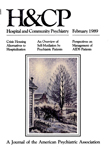A Comparison of Two Crisis Housing Alternatives to Psychiatric Hospitalization
Abstract
This study compared outcomes for demographically matched clients four months after their admission to two short-term crisis programs. The programs provided crisis housing and case management services as alternatives to psychiatric hospitalization for clients with severe and persistent mental illness. One program met housing needs by purchasing shelter in hotels and boarding houses, and the other provided lodging in an eight-bed crisis house. In both programs, two-thirds of the clients avoided hospitalization during four-month follow-up, and both programs were effective in stabilizing clients' housing and financial situations. Clients in the purchase-of-housing program showed an increase in substance abuse problems at follow-up. Average client costs were similar in the two programs. A critical program difference was the substantially higher staff turnover in the crisis house, which was later replaced with scattered-site crisis housing.
Access content
To read the fulltext, please use one of the options below to sign in or purchase access.- Personal login
- Institutional Login
- Sign in via OpenAthens
- Register for access
-
Please login/register if you wish to pair your device and check access availability.
Not a subscriber?
PsychiatryOnline subscription options offer access to the DSM-5 library, books, journals, CME, and patient resources. This all-in-one virtual library provides psychiatrists and mental health professionals with key resources for diagnosis, treatment, research, and professional development.
Need more help? PsychiatryOnline Customer Service may be reached by emailing [email protected] or by calling 800-368-5777 (in the U.S.) or 703-907-7322 (outside the U.S.).



